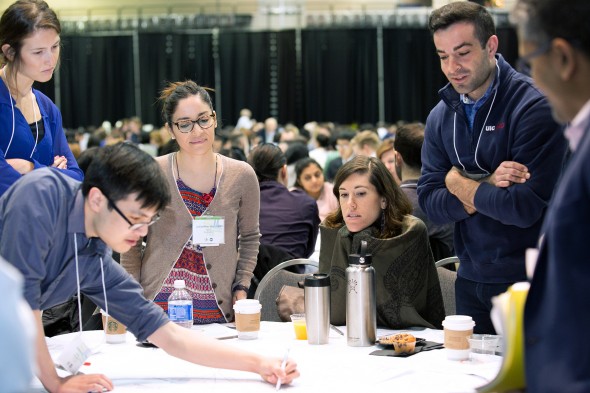Students get crash course in health care collaboration
It’s not often that health care takes a page out of NASCAR’s playbook, but UIC’s health sciences colleges are hitting the pavement to do just that.
At IPE Immersion Day, an event dedicated to boosting inter-professional health care collaboration, faculty and staff told students to work as a pit crew to help each other achieve a common goal.
“Lots of medical errors in patient care come because of inadequate communication,” said Mary Keehn, associate dean for clinical affairs in the College of Applied Health Sciences.
Sans oil and dirt like NASCAR’s version of a pit crew, IPE Immersion Day, which took place April 7, had students similarly working in unison.
Health care students discussed what they do in their field and listened to others’ specialization in hopes that they become more informed on how to properly address patients’ multifaceted needs.
“Reality is that right now patients’ problems are very complex because we know that it’s not just a biological kind of thing,” Keehn said.
“We know it’s got to do with their psychological status and the environment and the socioeconomics and all their social support systems. In order to be healthy or recover from an illness or an injury, you really do need expertise from multiple different professions.”
This year, IPE Immersion Day had 88 tables featuring 10 students and one facilitator each. Every table had students from at least six health sciences programs, ensuring a diverse professional simulation.
The facilitator, a faculty or staff volunteer, kicked off the discussion by explaining their field and describing situations where inter-professional communication is needed.
After an in-depth conversation, students left with a changed perspective on collaborative health care.
“IPE Immersion Day opened my eyes to see the many different health care disciplines that I will be working with once I graduate,” said Tiffany Nguyen, a student in health information management. “It made me step back and realize that, although I might have a lot of knowledge on a specific topic, I should let the specialist take the reins.
“We often generalize and assume we know all there is to know about physicians, nurses, physical therapists; however, there is a lot more that we have to learn about each health profession.”
The next step, according to Keehn, is for students to apply their knowledge to
real-world situations.
“This whole thing is really about affecting practices,” Keehn said.
“We want to educate people so that they can practice this effectively in collaborative teams.”

